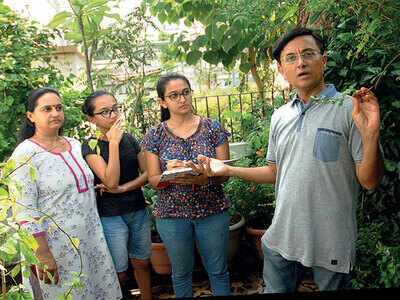Tailormade for my children

PARENT Sanjay Dave & CHILD Manushi Dave
By Kavya Nair
PICS: NILKANTH DAVE
Homeschooling is defi ned as a “practice where children get their formal education at home instead of schools. They are taught by their parents or tutors.” This is a practice that is not traditional, and that what is not traditional is often frowned upon. These individuals belong to a niche category of parents who have adopted the concept of homeschooling, and why they believe this is best for their child.
♦ PARENT : SANJAY DAVE,
49, runs an NGO
SANJAY: I learnt about homeschooling through poet Rajendra Shukla, whose sons were homeschooled. When my daughter reached class 7, she seemed to lose interest in school. This led me to look into this method of learning and found it suitable for her. Later, when she wanted to enjoy school life one last time, we enrolled her in a private school for classes 11 and 12. My younger one also decided to follow in her elder sister’s footsteps.
Why homeschooling?
For a long time, Manushi studied for the sake of it. I didn’t fi nd this form of education purposeful. I always believed that exam-oriented studies was a waste. Education is meant for personal development and to increase knowledge, which lacks in the traditional system. When Manushi said she was tired of the daily ‘ratta maaro’ and rigid system, we switched.
MANUSHI: I was disinterested in some of the subjects taught at school, but I had no option. ‘Enjoying’ school became diffi cult with growing emphasis on studying and almost zero focus on extracurriculars. Even sports class became a rigid system. I don’t think there’s a need to go to school to get educated, my dad found the perfect alternative
Advantages
Practical education was more interesting and easier to understand.Visual learning helped me remember facts better. My father and I, along with friends used to visit diff erent places to learn new concepts. Once I started homeschooling, I began reading a lot, which otherwise I couldn’t owing to excessive homework. I also picked up several skills — chess, fl ower-making, computer, guitar and classical music, etc.
Social life
I had a lot of friends in society, so I never felt lonely. Plus, I also met likeminded people at my extracurricular sessions. While going for educational visits, I could enjoy both studying and exploring various places.
♦ PARENT : VENKAT NAIDU,
50, electric engineer
♦ CHILDREN Therdha and Dharm, 14

VENKAT: Both my kids have been homeschooled since the beginning. I believe children deserve to inherit our knowledge, just like property. Therdha and Dharm are state level badminton players and homeschooling helped them concentrate on both, education and sports.
Why homeschooling?
I think private schools have become money-making factories that focuses only on infrastructure as the quality of teaching and teachers deteriorated. The problem with govt schools is that although there are excellent teachers, there’s no emphasis on students and infrastructure is poor. I was homeschooled till the age of fi ve, then went to a govt school.
This was the initial reason to get my kids homeschooled, but as they began showing interest in sports, my decision strengthened. I also observed that students would spend hours in tuitions after school, wasting a lot of money and time. They get no time for extracurricular activities. Homeschooling allows a healthy balance of education and sports and motivates ‘self-studying’ and ‘self-discipline.’
THERDHA AND DHARM:
We have never felt inferior to our counterparts. In fact, sometimes it feels, we have better understanding of some topics. While we spend a good amount of time on the badminton court, we also get to spend more than an hour on fi tness. Our friends, on the other hand, cannot, as they struggle between school and tuition. We also spend about half an hour reading the newspaper every day.
‘There need to be challenges’
I strongly believe that regular schooling provides the right platform to children to attain the milestones they need to accomplish in life. To stay within a system and follow designated order and rules is a challenge that everyone needs to overcome. This becomes a stepping stone to leading a professional life. However, for students with learning disabilities or students who are engaged in national and international level tournaments, homeschooling makes more sense.
Homeschooling is customised to a child’s mental and physical needs. The student can be channelised in the direction of his/her preference and/or interest. It is a more individualised and fl exible system where your day can be used more constructively. With regular schooling, you do not have the luxury to leave the subject that you do not like. On the other hand, you cannot learn the fi ner nuances of group dynamics, project work, cohesion orhealthy competition . There is no stepping outside your comfort zone.
Points to remember
1 Transition is not easy
2 Consider both pros and cons
3 Meet people who have experienced the same
4 Parents have to be more cautious and clear. With teachers who act as proxy parents out of the picture, their role increases
5 Students have to understand they will have to develop a sense of individual discipline
- NIMRAT SINGH,
Psychologist and author
♦ PARENT : TANU SETHI,
41, career counsellor
♦ CHILD Aarya Sethi, 13

TANU: Maggie went to a private school until class 6. Unhappy, we scouted for other options, but nothing deemed fi t. Finally, we decided to try homeschooling and we love the experience! Now, she has cleared class 8, and is skipping class 9 since the curriculum allows students to directly appear for class 10 once they turn 14.
Why homeschooling?
The main purpose was to focus on subjects my child was interested in, and acquire skills that would help her in future. Homeschooling is a lot more fl exible and customised, it’s stressfree, without the load of unnecessary homework and worksheets.
I fi nd the pressure to excel in every subject, along with participation in extracurricular activities, an overload for students. It seems like running a race we didn’t want to participate in, in the fi rst place. Art is my daughter’s passion, but it was never given importance in any of the schools she studied in.
MAGGIE: I’ve chosen a combination of arts,psychology , Indian culture and heritage. I believe homeschooling is a unique and creative way to study. The only disadvantage of the concept is to make the society understand that homeschooling isn’t a ‘crime’, but a method to educate oneself at one’s own pace.
Advantages
I can focus on health, wake up at my own pace, and spend time brushing up on my artistic skills. I am free from strict rules of the school. I - can bond with mom and pets. The best part about homeschooling is that I can spend more time on personal development. I feel more responsible, independent and mentally healthy.
Adapting to the concept TANU: Maggie was the one who researched about homeschooling and convinced me to consider taking up this concept. It took me a year to understand and adapt to the idea of homeschooling, but I’m glad I did.
‘It is subjective’
There is no defi nitive answer to what is better — homeschooling or regular schooling? It depends on various factors, including parents, child, his or her temperament, how much time the parents can allot, whether the kid is an independent learner or not.
Homeschooling dictates a lot of autonomy, there is a sense of self-discovery and openness, the brain does not have to learn in chunks of defi nite time, as is the case with regular schooling.
Most schools are designed as per the convenience of teachers and adults, with homeschooling, it is easy to go deep into one topic. However, the child cannot get integrated into the social network a school provides and becomes aloof.
A homeschooled student will turn out to be relatively more problem-solving oriented since he or she has not been taught to study for exams. In this sense, the school might be called an artifi cial environment.
Although, in school, one learns to deal with diff erent kinds of people and situations. An ideal homeschooling environment is where both parents allot suffi cient time to teaching along with additional resources and tutors.
The preferred direction of transition would always be from homeschooling to regular schooling as this would make things very easy for the student when he or she enters college. If reversed, the change will not be conducive.
- SUDHIR GHODKE,
Educationist
PICS: NILKANTH DAVE
♦ PARENT : SANJAY DAVE,
49, runs an NGO
♦ CHILD : Manushi Dave, 19
SANJAY: I learnt about homeschooling through poet Rajendra Shukla, whose sons were homeschooled. When my daughter reached class 7, she seemed to lose interest in school. This led me to look into this method of learning and found it suitable for her. Later, when she wanted to enjoy school life one last time, we enrolled her in a private school for classes 11 and 12. My younger one also decided to follow in her elder sister’s footsteps.
Why homeschooling?
For a long time, Manushi studied for the sake of it. I didn’t fi nd this form of education purposeful. I always believed that exam-oriented studies was a waste. Education is meant for personal development and to increase knowledge, which lacks in the traditional system. When Manushi said she was tired of the daily ‘ratta maaro’ and rigid system, we switched.
MANUSHI: I was disinterested in some of the subjects taught at school, but I had no option. ‘Enjoying’ school became diffi cult with growing emphasis on studying and almost zero focus on extracurriculars. Even sports class became a rigid system. I don’t think there’s a need to go to school to get educated, my dad found the perfect alternative
Advantages
Practical education was more interesting and easier to understand.
Social life
I had a lot of friends in society, so I never felt lonely. Plus, I also met likeminded people at my extracurricular sessions. While going for educational visits, I could enjoy both studying and exploring various places.
♦ PARENT : VENKAT NAIDU,
50, electric engineer
♦ CHILDREN Therdha and Dharm, 14

PARENT Venkat Naidu CHILDREN Therdha and Dharm
VENKAT: Both my kids have been homeschooled since the beginning. I believe children deserve to inherit our knowledge, just like property. Therdha and Dharm are state level badminton players and homeschooling helped them concentrate on both, education and sports.
Why homeschooling?
I think private schools have become money-making factories that focuses only on infrastructure as the quality of teaching and teachers deteriorated. The problem with govt schools is that although there are excellent teachers, there’s no emphasis on students and infrastructure is poor. I was homeschooled till the age of fi ve, then went to a govt school.
This was the initial reason to get my kids homeschooled, but as they began showing interest in sports, my decision strengthened. I also observed that students would spend hours in tuitions after school, wasting a lot of money and time. They get no time for extracurricular activities. Homeschooling allows a healthy balance of education and sports and motivates ‘self-studying’ and ‘self-discipline.’
THERDHA AND DHARM:
We have never felt inferior to our counterparts. In fact, sometimes it feels, we have better understanding of some topics. While we spend a good amount of time on the badminton court, we also get to spend more than an hour on fi tness. Our friends, on the other hand, cannot, as they struggle between school and tuition. We also spend about half an hour reading the newspaper every day.
‘There need to be challenges’
I strongly believe that regular schooling provides the right platform to children to attain the milestones they need to accomplish in life. To stay within a system and follow designated order and rules is a challenge that everyone needs to overcome. This becomes a stepping stone to leading a professional life. However, for students with learning disabilities or students who are engaged in national and international level tournaments, homeschooling makes more sense.
Homeschooling is customised to a child’s mental and physical needs. The student can be channelised in the direction of his/her preference and/or interest. It is a more individualised and fl exible system where your day can be used more constructively. With regular schooling, you do not have the luxury to leave the subject that you do not like. On the other hand, you cannot learn the fi ner nuances of group dynamics, project work, cohesion or
Points to remember
1 Transition is not easy
2 Consider both pros and cons
3 Meet people who have experienced the same
4 Parents have to be more cautious and clear. With teachers who act as proxy parents out of the picture, their role increases
5 Students have to understand they will have to develop a sense of individual discipline
- NIMRAT SINGH,
Psychologist and author
♦ PARENT : TANU SETHI,
41, career counsellor
♦ CHILD Aarya Sethi, 13

PARENT Tanu sethi , CHILD Aarya Sethi, 13
TANU: Maggie went to a private school until class 6. Unhappy, we scouted for other options, but nothing deemed fi t. Finally, we decided to try homeschooling and we love the experience! Now, she has cleared class 8, and is skipping class 9 since the curriculum allows students to directly appear for class 10 once they turn 14.
Why homeschooling?
The main purpose was to focus on subjects my child was interested in, and acquire skills that would help her in future. Homeschooling is a lot more fl exible and customised, it’s stressfree, without the load of unnecessary homework and worksheets.
I fi nd the pressure to excel in every subject, along with participation in extracurricular activities, an overload for students. It seems like running a race we didn’t want to participate in, in the fi rst place. Art is my daughter’s passion, but it was never given importance in any of the schools she studied in.
MAGGIE: I’ve chosen a combination of arts,
Advantages
I can focus on health, wake up at my own pace, and spend time brushing up on my artistic skills. I am free from strict rules of the school. I - can bond with mom and pets. The best part about homeschooling is that I can spend more time on personal development. I feel more responsible, independent and mentally healthy.
Adapting to the concept TANU: Maggie was the one who researched about homeschooling and convinced me to consider taking up this concept. It took me a year to understand and adapt to the idea of homeschooling, but I’m glad I did.
‘It is subjective’
There is no defi nitive answer to what is better — homeschooling or regular schooling? It depends on various factors, including parents, child, his or her temperament, how much time the parents can allot, whether the kid is an independent learner or not.
Homeschooling dictates a lot of autonomy, there is a sense of self-discovery and openness, the brain does not have to learn in chunks of defi nite time, as is the case with regular schooling.
Most schools are designed as per the convenience of teachers and adults, with homeschooling, it is easy to go deep into one topic. However, the child cannot get integrated into the social network a school provides and becomes aloof.
A homeschooled student will turn out to be relatively more problem-solving oriented since he or she has not been taught to study for exams. In this sense, the school might be called an artifi cial environment.
Although, in school, one learns to deal with diff erent kinds of people and situations. An ideal homeschooling environment is where both parents allot suffi cient time to teaching along with additional resources and tutors.
The preferred direction of transition would always be from homeschooling to regular schooling as this would make things very easy for the student when he or she enters college. If reversed, the change will not be conducive.
- SUDHIR GHODKE,
Educationist





































Recent Messages ()
Please rate before posting your Review
SIGN IN WITH
Refrain from posting comments that are obscene, defamatory or inflammatory, and do not indulge in personal attacks, name calling or inciting hatred against any community. Help us delete comments that do not follow these guidelines by marking them offensive. Let's work together to keep the conversation civil.